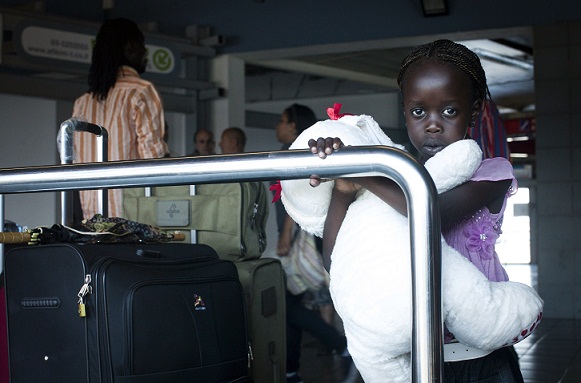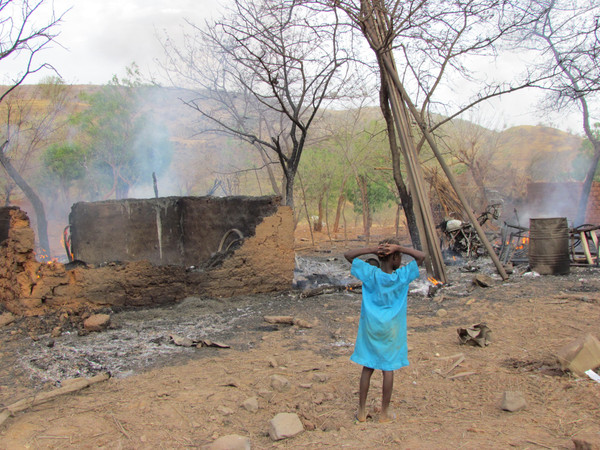
A South Sudanese girl awaits deportation to South Sudan from Israel on June 17, 2012. (Oren Ziv/AFP/GettyImages)
Earlier this month, an Israeli court paved the way for Israeli authorities to deport over 1,500 South Sudanese migrants back to South Sudan, where they face an uncertain future, and may face threats to physical security depending where they end up.
One might get the sense that Sudanese are unwelcome in Israel.
“The Sudanese are a cancer in our body,” said Miri Regev, member of the Knesset during a public demonstration in Tel Aviv, which saw African passersby attacked.
Today is World Refugee Day—a day marked to remind the world of the tens of millions who face uncertainty, threats to physical security, and persecution by repressive governments.
This reprehensible law imposes prison time of 5 to 7 years on asylum seekers who enter Israel irregularly.
The Knesset recently passed the onerous amendment to the “Prevention of Infiltration” law, which—in contravention of international law and the Refugee conventions—criminalizes asylum seekers who enter or reside in Israel “irregularly” (who enter or are present in a country without documents). This reprehensible law imposes prison time of 5 to 7 years on asylum seekers who enter Israel irregularly.
“Regularity” for people fleeing from persecution is surely a luxury.

A child looks at burning remnants after an Antonov dropped two bombs in Kauda, Southern Kordofan, Sudan, on 29 April 2012.
What is more, Israeli authorities’ denial of determination for asylum seekers, and the amended Infiltration law itself, flies in the face of 60 years of refugee and asylum law and practice. Under the 1951 Refugee Convention and the 1967 Protocol, states are not permitted to impose penalties on refugees for simply entering a country or being present illegally.
Additionally, any discrimination against asylum seekers based on their country of origin or religion is a clear violation of one of the key tenants of the refugee regime—non-discrimination. Simply put, an asylum seeker, regardless of where they are from, whatever their religion, and whatever their race, must have access to asylum, and a clear and non-discriminatory process for refugee determination.
The passage of the Infiltration amendment and the recent explosion of violently xenophobic rhetoric such as ‘Sudanese being a cancer’ seem difficult to decouple, in my mind.
World Refugee Day also commemorates the passage of the 1951 Refugee Convention setting out the rights of and responsibility toward refugees. The convention itself was borne from challenge of dealing with the millions of refugees displaced by Nazi aggression and persecution, and the devastating displacement caused by the war in Europe.
The Israeli parliament must immediately repeal the “Infiltration” bill, which is wholly incompatible with international law, and must grant clear and non-discriminatory determination access to the tens of thousands of asylum seekers in Israel.
The failure to grant due process and the criminalization of asylum seekers in Israeli is not in keeping with decades of global efforts to protect the persecuted and displaced. And it is a blemish on today’s anniversary.
I should note that the "not anymore" part of the title of this post should be taken with an historical grain of salt. Successive Israeli governments have had differing policies and practices of treatment of asylum seekers.
Clearly, the current state of affairs for refugees and migrants in Israel–particularly Eritreans and Sudanese–is at a notable, historic low.
Since Africa is a continent of 30 million sq. kilometers and a population of almosy 1 billion people, hundereds of millions of whom are the poorest of the poor anywhere on earth, it is logical that Israel, a mostly waterless desert country with a land area of 20,000 sq. kilometers, so 1500 times smaller than Africa should be looked to solve Africa's poverty problems by accepting millions of economic refugees and being overrun.
Pure logic.
You did not mention several important facts in your blog:
Firstly all these "refugees" have before getting to israel passed through a country of first refuge on the way to Israel, namely Egypt and under international law it is Egypt that must give them refugee status, not Israel. Egypt catagoricaly refuses to give any of these these people refuge and just pushes them to the Israeli border instead, but I noticed Amnesty has never made a peep about Egypt's shunning of it's legal responsibilities as the nation of first refuge.
Secondly you also forgot to mention that the one or two demagoge politicians who made nasty remarks about the refugees and the few dozen kooks who rioted were condemded by the entire rest of Israeli society, media and government.
Hi, Judonimh–
Just a couple corrections for our readers.
First, Amnesty International has been highly critical of the Egyptian authorities for treatment of migrants and refugees. The top three google searches for "Egypt Refugees Amnesty International":
"EGYPT: SUDANESE REFUGEES AT RISK OF FORCIBLE RETURN" http://www.amnesty.org/en/library/asset/MDE12/017…
"Egypt: Deadly journey through the desert" http://www.amnesty.org/en/news-and-updates/egypt-…
"Egypt: Four migrants killed – Authorities must reign in border guards" http://www.amnesty.org/en/for-media/press-release…
There are many more, but you get the idea.
Second, under international law, it is true that Egypt has a responsibility to process asylum claims. However, migrants have no obligation to seek refuge in Egypt or any state. Should asylum seekers present themselves in Israel (or anywhere else) the authorities of that state have a legal obligation to process asylum claims in a fair and non discriminatory due process.
I am happy to hear about the rounded condemnation of both the statements and the rioting, and am indeed aware of the condemnation. Pointing readers to this incident is in no way intended to be an indictment of Israeli society. The incident does–however–represent a a troubling potential undercurrent of xenophobia, that may or may not be spilling into policies related to the status and treatment of refugees and asylum seekers present in Israel. It remains difficult to decouple in my mind.
Whatever the reason, the government has obligations under international law that it cannot abrogate. Israel's obligations in this respect extend to the borders of the state, and have no obligation under refugee law to "Africa," nor to accept "millions" (or *any* for that matter), 'economic' migrants.
But due process–the bedrock of democratic institutions, human rights, and non discrimination–is threatened in Israel's treatment of asylum seekers, and I do hope "Israeli society, media, and government" are equally shocked at the effects of the "Infiltrator" law, as amended.
thank you for your comments,
scott (author)
Most of the African refugees who reach Israel are not fleeing from their homelands.
The Africans refugees are mainly fleeing from racism and oppression in Egypt.
The Egyptian people treat them terribly and when African refugees have tried in the past to peacefully protest the appalling conditions the Egyptians forcibly keep them in, dozens of African refugees get shot down dead on the street by Egyptian police and Amnesty never said a word about this.
In Israel on the other hand the African refugees regularly peacefully hold protests and nothing is ever done to them at all by the Israeli authorities. To the contrary, the great majority of the Israeli Jewish population has sympathy for them, since most Jews were descended from refugees themselves.
Israel is offering to pay each South Sudanese 3000 $ and a free plane ticket back to the new country of South Sudan. Calling paying someone to voluntarily return to their homeland as abuse is just ridiculous.
And claiming it is too dangerous for these people to return to their homeland is equally ridiculous. Israel, with 150 rockets fired on it in just the last week, and 100s of thousands of heavy rockets from every direction set to be fired on to Israeli civilians in the event of a major war outbreak, Israel can be arguable described as even more dangerous than South Sudan.
I can't believe it ,how it can be happened in Israel ?! .. well Israel is well-known for understand and helping people as we talk about south sudan ,where war ,conflict. They are still suffering..! It's quite unacceptable! I personally urge and appeal to authorities in Israel to consider this problem seriously.
Thanks Pari! Please spread the word and encourage people to read the article.